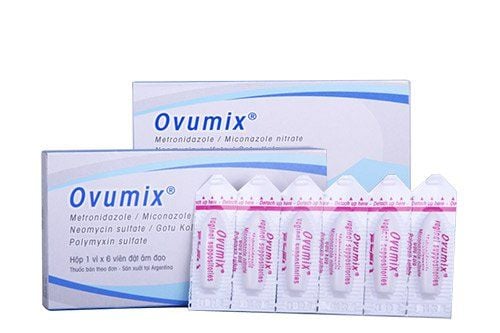This is an automatically translated article.
The article is professionally consulted by Master, Doctor Nguyen Van Thanh - Obstetrician and Gynecologist - Department of Obstetrics and Gynecology - Vinmec Ha Long International HospitalGynecological infections during pregnancy are caused by an increase in the amount of hormones in the pregnant woman's body, and at the same time the kidney function is reduced, creating a favorable environment for bacteria to invade and grow. If not treated in time, gynecological inflammation during pregnancy can adversely affect the fetus.
1. Gynecological inflammatory diseases during pregnancy and the extent to which it affects the fetus
1.1. Candidiasis Candida fungi usually reside inside the vagina, these fungi are completely harmless when the environment is kept in balance. However, during pregnancy, the sudden increase and decrease of hormones changes the vaginal pH, creating favorable conditions for fungi to multiply, grow and cause disease. The treatment of vaginitis during pregnancy caused by Candida is usually very easy, but the disease is easy to recur many times.In case the mother has a gynecological disease during pregnancy without definitive treatment, when giving birth through the vagina, the fungus can stick to the oral mucosa causing black mouth or fungal dermatitis for the newborn. More dangerously, the fetus may suffer from malnutrition in utero or increase the risk of premature birth, weak resistance, and possibly fungal pneumonia. Therefore, pregnant women need to treat the disease completely before giving birth to avoid infecting the baby during childbirth.

Gynecological infections during pregnancy caused by this group of bacteria are often associated with dangerous pregnancy complications such as premature rupture of membranes, amniotic fluid infection, risk of miscarriage when the fetus is large, increased risk of miscarriage. The risk of preterm birth is two times higher than that of people without the disease, having a low birth weight baby, endometritis after vaginal delivery or caesarean section. Therefore, the pregnant mother should not be subjective with abnormal signs in the private area.
1.3 Gonococcal vaginitis Gonorrhea is also a cause of gynecological pruritus during pregnancy, with a high degree of danger. If the incubation period is long, the mother will experience symptoms such as: painful urination, cloudy urine with pus, heavy white discharge, and pain in the lower abdomen.
Gynecological diseases during pregnancy caused by gonococcal bacteria, if not treated completely, will adversely affect the fetus: the risk of premature birth increases to 8%, causing amnionitis, rupture of membranes, and low birth weight babies. due to fetal malnutrition. Besides, gonorrhea bacteria easily infect the baby during vaginal birth. Bacteria from the mother's genital secretions enter the newborn's eyes, causing neonatal conjunctivitis. Therefore, from the second day after birth, the baby's eyes will be congested, with a lot of yellow pus, causing vision loss and possibly blindness.
Trắc nghiệm: Bạn có hiểu đúng về dấu hiệu mang thai sớm?
Các dấu hiệu mang thai sớm không phải chỉ mỗi trễ kinh mà còn có rất nhiều dấu hiệu khác như xuất huyết âm đạo, ngực căng tức,… Điểm xem bạn biết được bao nhiêu dấu hiệu mang thai sớm thông qua bài trắc nghiệm này nhé!
2. Vaginal tablets to treat gynecological diseases during pregnancy affect the fetus?
The use of drugs in pregnant women, especially in the first months, is very important. Most of the drugs used by pregnant women during pregnancy, whether by injection, orally, or by placing (under the tongue, tablets placed in the vagina, in the anus), throat spray or nose drops... even topical drugs. ... can also follow the mother's blood into the fetus through the fetal circulatory system, so there are many drugs that can be toxic to the fetus.More specifically, if a woman has vaginitis during pregnancy, depending on the condition, the doctor is required to prescribe medication for pregnant women. The type of vaginal suppository that doctors prescribe is usually a combination of 3 antibiotics and antifungal drugs: Neomycin, Nystatin and Polymyxin B, for local treatment of bacterial infections in the vagina and cervix. caused by bacteria or viruses. With this type of vaginal tablet, pregnant women can safely use it during pregnancy without worrying about affecting the health of the fetus.
However, the use of drugs at this time is quite sensitive, so pregnant women should not arbitrarily use drugs but must absolutely follow the instructions of the doctor. Sometimes some drugs only make the condition go away temporarily and recur many times, more dangerously, it will adversely affect both mother and fetus.

3. Principles of preventing gynecological infections during pregnancy
Clean the private area clean and properly, do not douche too deep inside the vagina, wash from front to back (from vagina to anus), do not do the opposite. Choose underwear made of cool, absorbent materials. Avoid using strong detergents and solutions. Eating a lot of yogurt is very effective in preventing vaginitis. Limit eating sugar and sweets because they increase the amount of secretion in the vagina. When having gynecological inflammation, it is necessary to avoid marital relations. If detected and treated promptly, vaginitis during pregnancy will not affect the health of mother and baby. Therefore, if there are symptoms of pain, itching, ... vaginal area, suspected gynecological infection, women should go to the doctor for timely diagnosis and treatment.Please dial HOTLINE for more information or register for an appointment HERE. Download MyVinmec app to make appointments faster and to manage your bookings easily.














